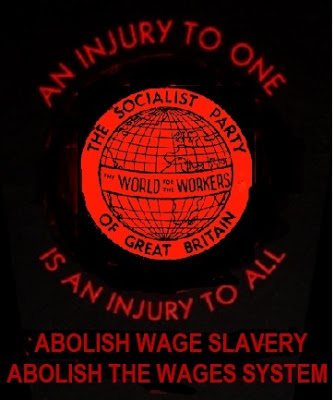One of the chief causes of the disagreement between the Socialist Party and other political parties claiming to be socialists is that we tell the workers that there can be no solution except by the establishment of the socialist commonwealth; that the capitalist politicians, of whatever label, desire to maintain the capitalist state. Under no circumstances will we beg or appeal to them—our class enemies—to do something which we know they will not do. Working people must accomplish their own emancipation, organised as a socialist party, independent of and hostile to all other parties. That emancipation will never be obtained otherwise. Capitalism is hell for the workers. There is only one way by which they can get out of it, and that is by organising for the revolution, by joining the party of the revolution, The Socialist Party.
Search long enough and you’ll find other political organisations which mouth off once a decade about free access or the abolition of the wages system, but you’ll search a lot longer before you find any which never align themselves with some attempt to rearrange capitalism. Our opposition to reformism is well grounded because reforms are by their nature divisive and therefore work against the vital condition of working-class unity. The only interest guaranteed to be shared by all is an interest in ending their position as wage slaves.
The Socialist Party holds that parties which advocate reforms attract reformists, not Socialists; perpetuate the illusion that capitalism can be reformed satisfactorily; and end up being swamped by reformist elements.
We define a reform as a politically-implemented measure and so don’t include wage increases as a “reform”, or wages struggles as “reformist”, even if these are still changes within capitalism. We are all in favour of workers struggling to get the best deal they can for the sale of their labour power to employers. The Socialist Party in declining to put forward a programme of immediate demands does not take up the untenable position that the position of the workers under capitalism is such that they could not be worse off if they gave up the struggle to defend their wages and working conditions; nor do we maintain that reforms are valueless. What we do maintain is that reform programmes inevitably attract reformists, and produce reformist organisations incapable of working for socialism; that only by working directly for socialism will it be achieved; that parties lacking solid socialist support and depending on reformists cannot achieve socialism even if they obtain control of the political machinery; that reforms cannot end the subject-position of the working class although they may be of small temporary or sectional benefit; that the small value of the reforms obtainable by reformist political action is In no way commensurate with the years of work and the volume of effort required to achieve them and that incidentally, the capitalists will give concessions more readily in an endeavour to keep the workers away from a growing socialist movement than they will in response to the appeals of bodies based on programmes of reforms.
There are but two classes in society—the producers of wealth and the master class. If by a trade union or any other effort the working class succeed in securing a larger share of the product of their labour, it must necessarily be at the expense of the master class. Competition among the latter compels them to be always on the lookout for means whereby the cost of production may be reduced and profits increased. Under capitalism the working class are poor. Some get a “fair” wage and are poor; some get a sweated wage and are poor; others are unemployed and get no wage at all. They are all poor.
We assert that the working class has no concern with the advocacy of reforms. If it is claimed that reforms, temporary though they may be in their effect, are needed, then the surest and quickest way to secure them is to organise for socialism and for socialism alone. Then the master class will throw reforms to the working class as an “antidote.”
The work of the socialist is to build up a socialist party, clear in the knowledge of the irreconcilability of the interests of the wage worker and the master, ever warning the working-class of the pitfalls in the shape of “labour” parties strewing the path which leads to emancipation from wages, ever teaching the slaves of capitalism that only by the overthrow of the present system of society and the establishment of the socialist commonwealth can the various evils confronting the working-class be removed. In this country, The Socialist Party of Great Britain alone stands for the Revolution. The Socialist Party is the only Party which at its formation and ever since has declined to side-track the working class by advocating palliatives.








